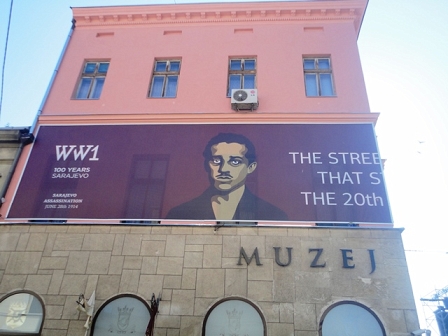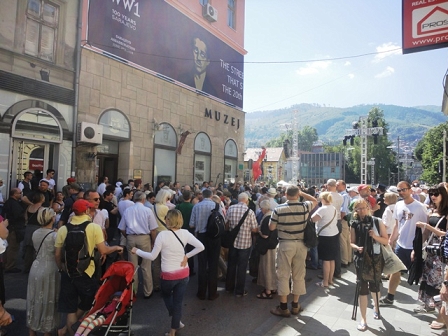Erstellt am: 28. 6. 2014 - 18:11 Uhr
The shot that changed world history
by John Cummins, FM4
FM4 Reality Check
The death of Franz Ferdinand, the heir to the Austro-Hungarian throne, set off a chain of events that triggered World War One, the deadliest conflict the world had ever known.
Dieses Element ist nicht mehr verfügbar
One hundred years later the assassination still has a symbolic power that few events manage to achieve. On the spot where the shooting occurred, amid crowds of tourists jostling with reporters, a huge billboard reads: “The street corner that started the 20th Century.”

John Cummins
Many things changed as a result of that fatal gunshot. In the space of a few short years, Austria-Hungary would cease to exist, new democracies would be born across central Europe, and 16 million people would die in a mechanised slaughter previously unimaginable.
The assassination also had lasting repercussions for Bosnia. The country would join the newly formed Kingdom of Serbs, Croats and Slovenes, the forerunner of Yugoslavia, only for that federation to unravel 80 years later, with Bosnia again the setting for a bloody conflict, fuelled this time by terrible ethnic rivalries.
When 19 year old Gavrilo Princip and his co-conspirators from the Young Bosnia movement set out to murder the Archduke in 1914, they could not possibly have known any of this. Their goal was simply to free Bosnia from Austrian rule. In fact one of the young men later stated that he would have blown himself up, had he known the horrific repercussions that his actions would have.

John Cummins
The lessons to be learnt are both simple and complex. First, that a single action can have such profound consequences, both good and bad. And even more importantly - that the world is never more than a well-timed gunshot away from mass slaughter.
Watching the crowds in Sarajevo eagerly snapping pictures of the assassination site, or preparing to attend one of the many functions, concerts or exhibitions taking place across the city, it’s easy to forget this. It’s also easy to overlook the unease that this commemoration provokes in the city’s inhabitants.
Many Bosnian Muslims regard Gavrilo Princip as a Serb terrorist. While to some Serbs he remains a hero, the liberator of Bosnia, the man who made possible the unification of the South Slavs.
The leaders of Serbia and the Bosnian Serbs are notably absent as the dignitaries gather in Sarajevo. They are holding their own rival commemoration in the eastern city of Visegrad. It’s no surprise really. The ethnic motives that prompted Gavrilo Princip are stronger than ever today, and show little sign of abating.
Many young people hope, however, that this anniversary will be a time of healing. Sarajevo, they say, has been associated for too long with death and destruction. They want to put all that behind them and look to the future.
The city gleams in the afternoon sunlight. Western tourists rub shoulders with women veiled in headscarves, while the muezzin’s call vies with the sound of hip hop and orchestras tuning up for the evening’s concert. Sarajevo was once an ethnic melting pot – a city where east met west, where Catholic Croatians, Muslim Bosnians and Orthodox Serbs lived side by side. The greatest shame is that the city is not remembered for this but for rather for a single shot. The gunshot that changed world history.

